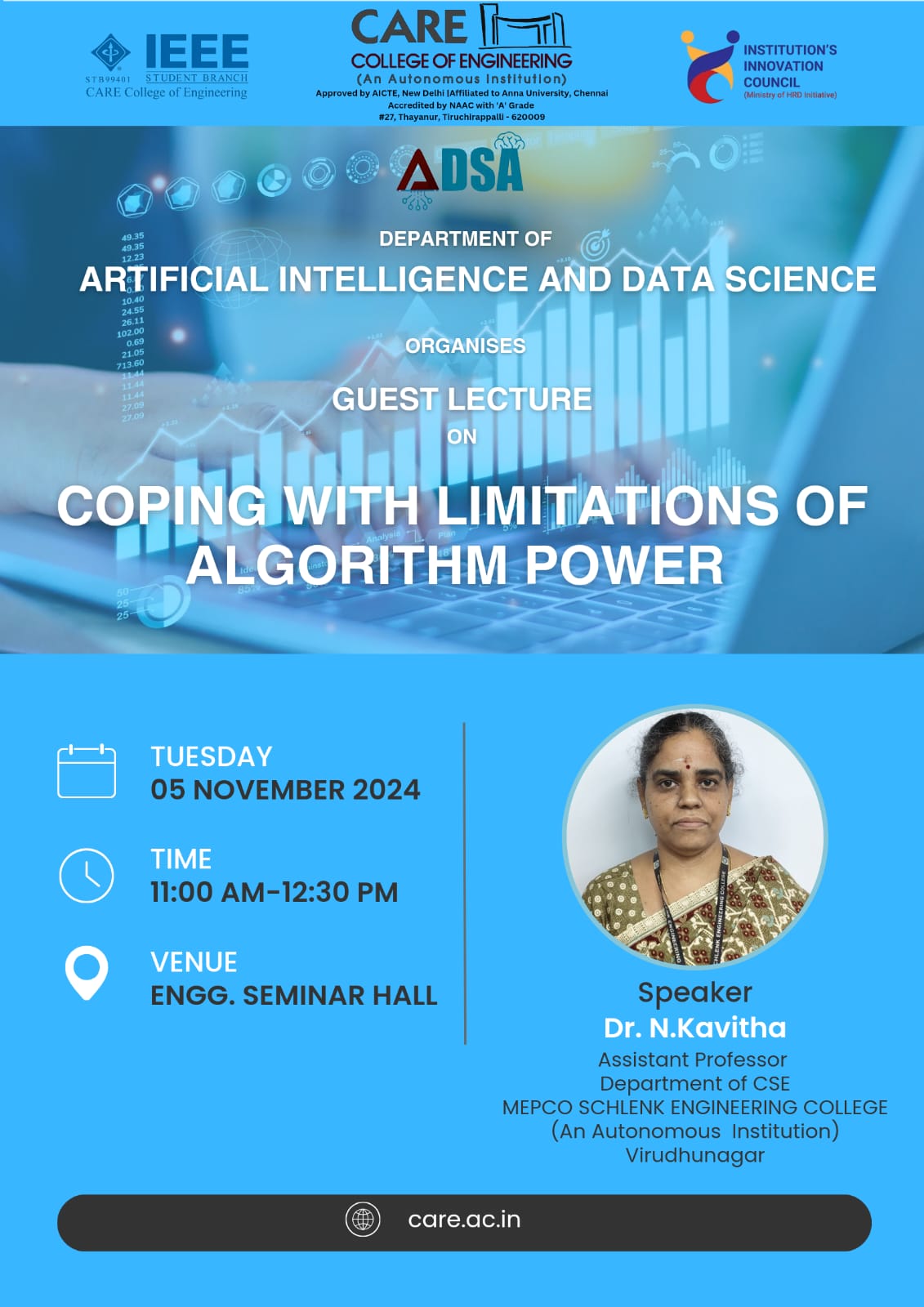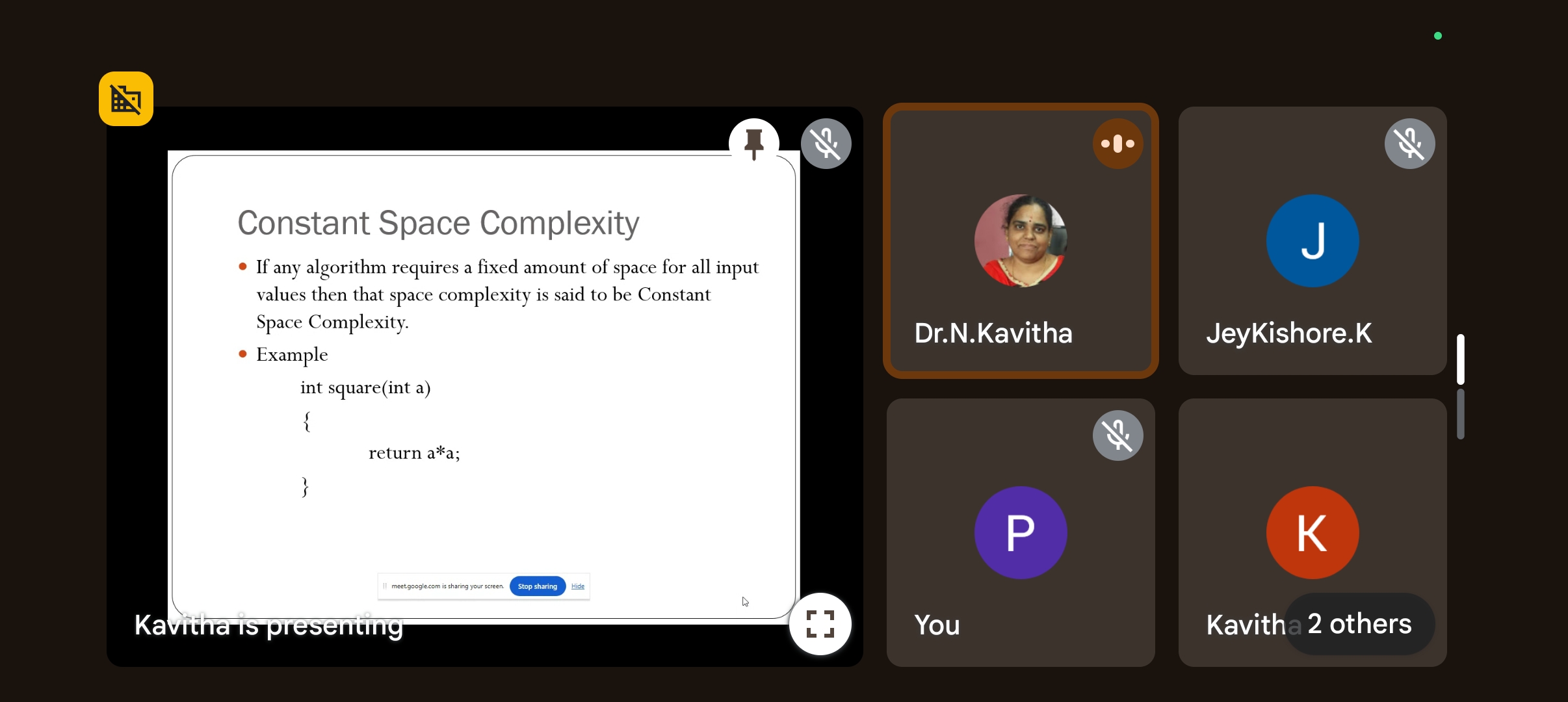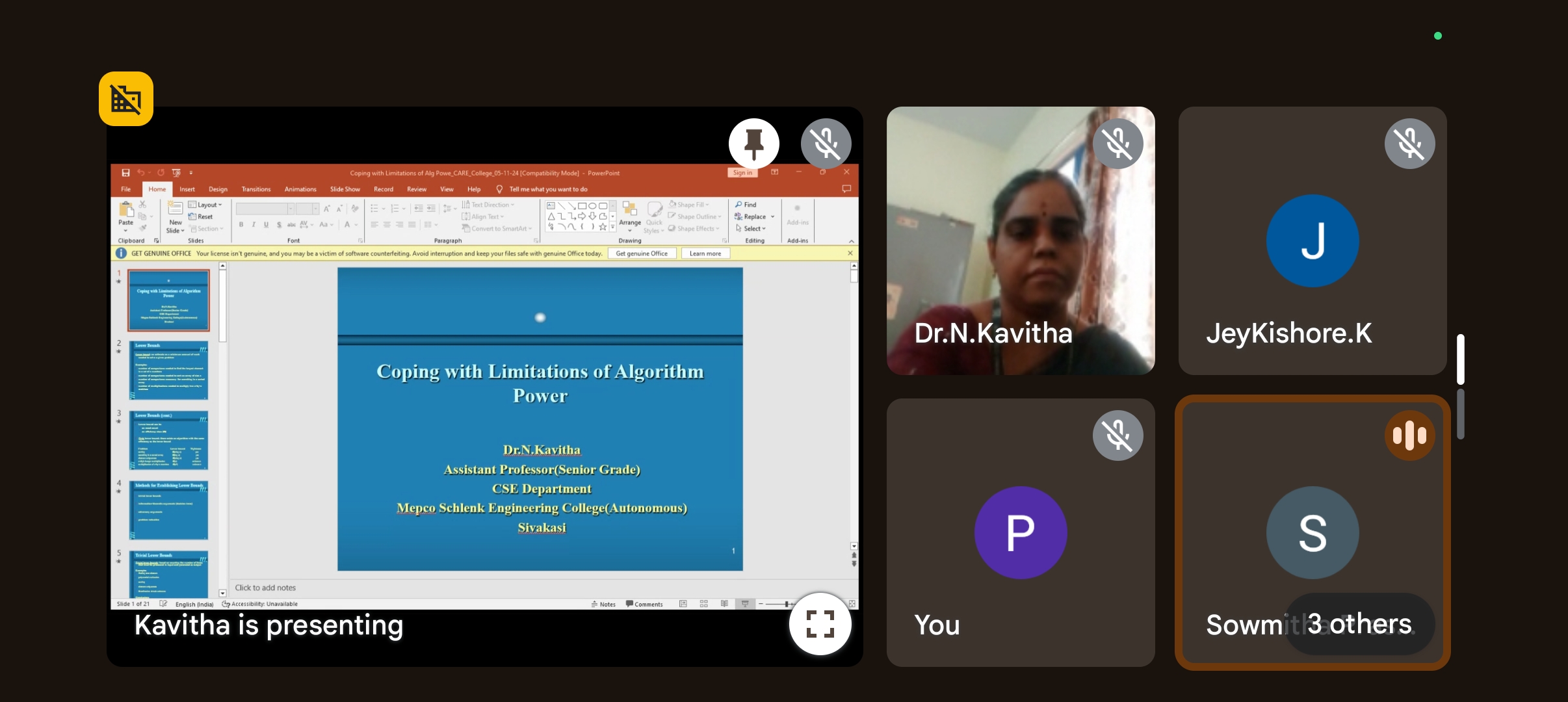 GUEST LECTURE OBJECTIVES:
GUEST LECTURE OBJECTIVES:
The primary objective of this guest lecture was to introduce students to the challenges that arise due to algorithmic limitations, particularly in terms of computational power, and how to mitigate these challenges through optimization techniques. The lecture also aimed to equip students with practical methods for coping with algorithmic complexity in data-intensive applications such as data warehousing.
CONTENT
On 5th November 2024, between 11:00 AM to 12:30 PM, the Department of Artificial Intelligence and Data Science organized a guest lecture for second year students for the course “AD3351 – Design and Analysis of Algorithms ” on the topic "Coping with Limitations of Algorithm Power" .
Dr. N. Kavitha, Assistant Professor from Department of CSE of Mepco Schlenk Engineering College, delivered the session. The lecture provided an insightful analysis of the limitations of traditional algorithms in large-scale data systems and offered strategies to optimize performance.
The guest lecture covered the following key topics in Coping with Limitations of Algorithm Power:
1. Introduction to Algorithmic Complexity:
o Dr. N. Kavitha introduced the concept of algorithmic complexity, explaining how the efficiency of algorithms (both time and space complexity) can significantly impact system performance. She highlighted the challenges posed by complex algorithms in large-scale data environments and how these can lead to slow performance or even failure in real-time systems.
2. Types of Algorithmic Limitations:
o Time Complexity: The impact of high time complexity on algorithm performance, particularly when processing large datasets or executing complex queries in a datawarehouse.
o Space Complexity: The challenges of memory usage and data storage, especially when working with vast amounts of data, and the importance of efficient memory management.
3. Strategies to Overcome Limitations:
o Optimized Algorithms: Dr.N.Kavitha discussed optimization techniques such as dynamic programming, greedy algorithms, and divide-and-conquer strategies to reduce time complexity and improve the performance of algorithms.
o Approximation Algorithms: When exact solutions are too resource-intensive, approximation algorithms offer a viable alternative. These techniques provide " good-enough" solutions more efficiently.
o Parallel Computing: The lecture covered how parallel and distributed computing can help overcome computational limits by enabling the simultaneous execution of tasks,thus reducing the overall runtime.
o Data Preprocessing and Indexing: Techniques like indexing and materialized views were discussed, showing how they can speed up data retrieval and optimize queries in data warehouses.
4. Heuristic Approaches:
o Dr.N.Kavitha introduced the concept of heuristics in solving algorithmic problems where finding an exact solution would be computationally expensive. She explained how heuristic methods can provide near-optimal solutions in much less time, especially in fields like data mining, AI, and machine learning.
5. Real-World Applications:
o The session connected the theoretical concepts with practical, real-world examples from industries such as finance, healthcare, and e-commerce. Dr.N. Kavitha emphasized how optimized algorithms and parallel computing are essential in improving decision-making
and operational efficiency in these sectors.
6. Trade-offs in Algorithm Design:
o A major take away from the lecture was understanding the trade-offs between optimality and efficiency. Dr.N.Kavitha illustrated how engineers must often decide between the best possible solution and a solution that is computationally feasible and practical.
The students gained valuable insights into the challenges posed by algorithmic limitations, particularly in large-scale data processing environments. They learned how to design optimized algorithms and apply techniques such as parallel computing, approximation methods, and data preprocessing to overcome these limitations. The lecture emphasized the importance of balancing computational
efficiency with solution accuracy in real-world applications. The interactive Q&ans; A session provided students with an opportunity to clarify their doubts and explore real-world scenarios, helping them understand how industries address algorithmic bottlenecks and ensure optimal performance in complex systems.
GUEST LECTURE OBJECTIVES:
To introduce students to the challenges posed by algorithmic limitations in data processing and provide strategies to optimize algorithm performance, focusing on computational efficiency, scalability and real-world applications.
GUEST LECTURE OUTCOMES:
1. Demonstrate the ability to identify and address algorithmic limitations, including time and space complexity, in large-scale data systems.
2. Apply optimization techniques such as parallel computing, approximation algorithms, and dynamic programming to improve algorithm efficiency and reduce computational bottlenecks.
3. Analyze real-world scenarios where algorithmic constraints impact performance and design practical solutions to ensure fast, reliable data processing in data-intensive applications.
COVERAGE OF PO’S AND PSO’S:
This guest lecture was aligned with several Program Outcomes (POs) and Program Specific Outcomes (PSOs) of the Artificial Intelligence and Data Science program:
Program Outcomes (POs):
PO1: Engineering Knowledge
The lecture highlighted how students can apply fundamental knowledge of algorithms and computational principles to solve complex engineering problems, focusing on optimizing data processing in large-scale systems.
PO2: Problem Analysis
Dr. Kavitha’s session provided an opportunity for students to analyze complex algorithmic challenges, using mathematical principles and engineering knowledge to find effective solutions for data-intensive applications.
PO3: Design/Development of Solution
The lecture helped students understand how to design algorithms that are computationally efficient and meet specific needs in data warehousing systems, considering performance constraints and the scalability of the solution.
PO4: Conduct Investigations of Complex Problems
The session encouraged students to conduct in-depth investigations of algorithmic limitations using experimental methods, ensuring that students can make data-driven decisions when optimizing algorithms.
PO5: Modern Tool Usage
The use of modern tools, such as parallel computing techniques and data pre-processing strategies, was emphasized. Students learned how to select and apply the right tools for optimizing algorithms in real-world data warehouse environments.
PO6: The Engineer and Society
Students were made aware of how optimized algorithms can have a positive impact on society by improving the efficiency of industries like healthcare, e-commerce, and finance, leading to better services and decision-making.
PO7: Environment and Sustainability
Dr. N. Kavitha discussed the importance of designing energy-efficient algorithms, particularly in the context of data warehousing, to ensure that solutions are environmentally sustainable in the long term.
PO8: Ethics
Ethical considerations in algorithm design were discussed, particularly the trade-offs between optimal solutions and their computational cost. Students were encouraged to make responsible decisions regarding resource allocation when designing algorithms.
PO9: Individual and Teamwork
The lecture fostered both individual problem-solving skills and teamwork in addressing algorithmic challenges. Students were encouraged to collaborate and share insights when working on large-scale system optimizations.
PO10: Communication
Students practiced clear communication skills during the Q&A session, discussing complex algorithmic concepts and optimization strategies in an accessible manner.
PO11: Project Management and Finance
The lecture illustrated the importance of considering cost-effectiveness in algorithmic solutions, as well as how optimization can reduce computational costs in large-scale projects, an important skill in project management.
PO12: Life-Long Learning
Dr. N. Kavitha encouraged students to engage in lifelong learning, as the field of algorithmic optimization is continuously evolving with new techniques and technologies, ensuring students remain adaptive to technological advancements.
Program Specific Outcomes (PSOs):
PSO1: Applying AI Principles and Practices for Developing Innovative Solutions to Society
The guest lecture illustrated how AI principles, such as heuristic methods and approximation algorithms, can be applied to develop innovative solutions to societal challenges, particularly in
large-scale data systems like data warehousing.
PSO2: Adapting Emerging Technologies and Tools for Solving Existing/Novel Problems
Dr. N. Kavitha emphasized the need to adopt emerging technologies, such as parallel computing and machine learning algorithms, to solve novel problems in data processing and algorithm optimization, equipping students to stay ahead in the fast-evolving technological landscape.



